SEBI SDD Software – Structured Digital Database As Per PIT Regulations By SEBI
SEBI SDD Software (Structured Digital Database) & UPSI Management Tool As Per SEBI’s PIT Regulations 2015 & SDD Law – Software Sahayak | April 2025
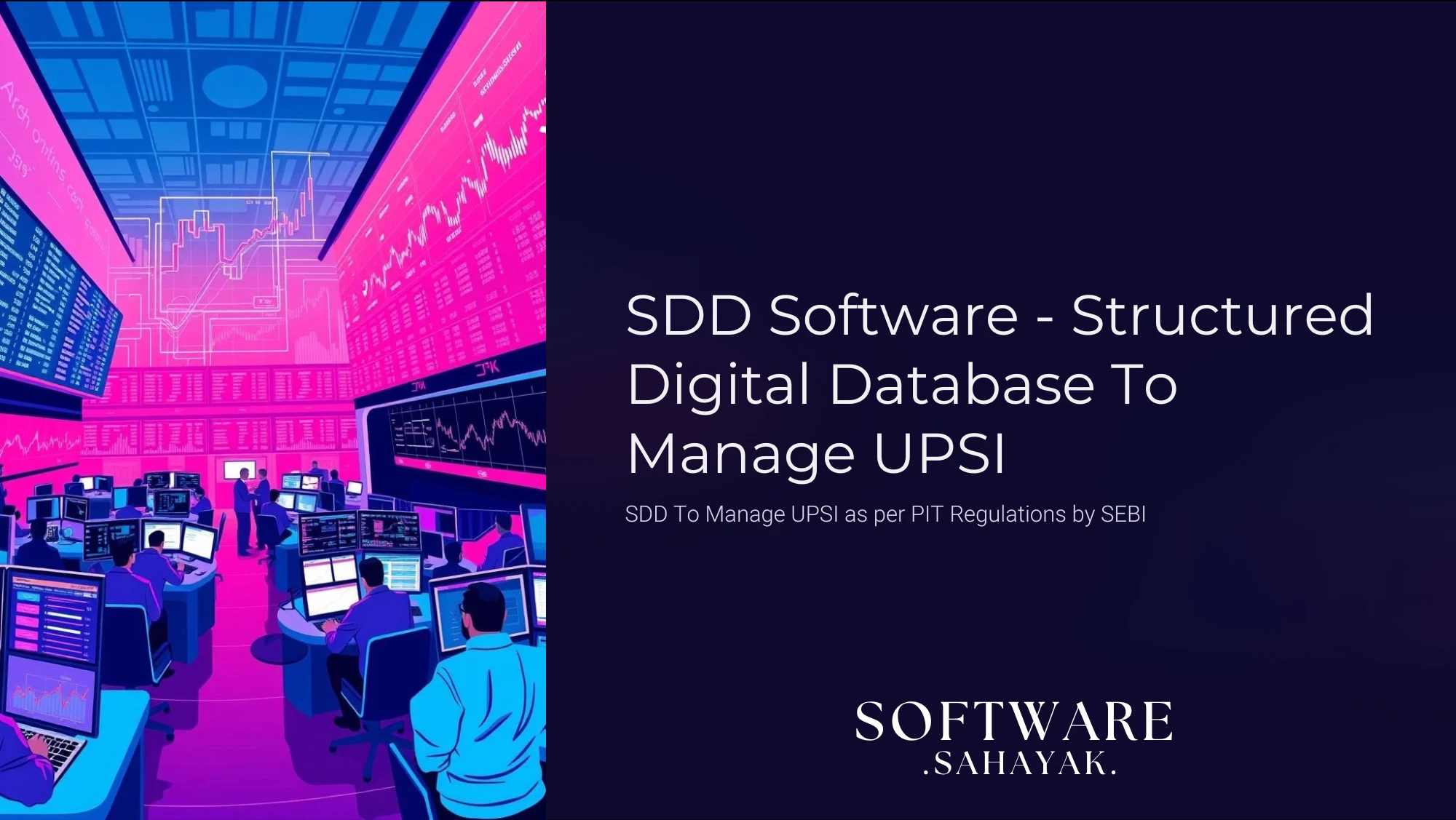
What is SDD Software – SDD Software To Manage UPSI
What is SDD Software?
SDD Software is a Structured Digital Database To Manage UPSI. A digital database or UPSI Management Tool is mandatory by SEBI (Securities Exchanges Board of India) for listed entities coming us with their IPO in NSE (National Stock Exchange) and/or BSE (Bombay Stock Exchange). SDD Software helps the company to stay compliant with SEBI Regulations for PIT (Prohibition of Insider Trading).
As per the guidelines, if you receive or share the UPSI with any individual or group, you are required to keep the details for the same under SDD having the UPSI date and the realtime stamping including the the name, details & purpose of UPSI. Software Sahayak can surely help you to find a best SEBI SDD Software with compatible features and user friendly interface following the complete guidelines to fulfill your requirements of SDD System and help you to stay compliant with SEBI ready reports & statements. Let’s understand what is UPSI…
What is UPSI?
The term UPSI means Unpublished Price Sensitive Information – any information for the listed entity which can fluctuate the price to either up or down side and is not published yet but if shared with anyone prior it’s public, one can gain from the information that will make it insider trading which is illegal in India.
Now, as we have seen the meaning and understood the term, let’s see some examples of what is included in UPSI…
What is included in UPSI?
As mentioned above, the term UPSI means Unpublished Price Sensitive Information. UPSI includes but not limited to the following events; quarterly results, annual results, dividend, change in capital/equity structure, change in management, merger, demerger, acquisition, winning or loosing important projects/delas, etc.
- Quarterly/annual results
- Dividends
- Changes in capital/equity structure
- Management changes
- Mergers, acquisitions, demergers
- Major project wins/losses
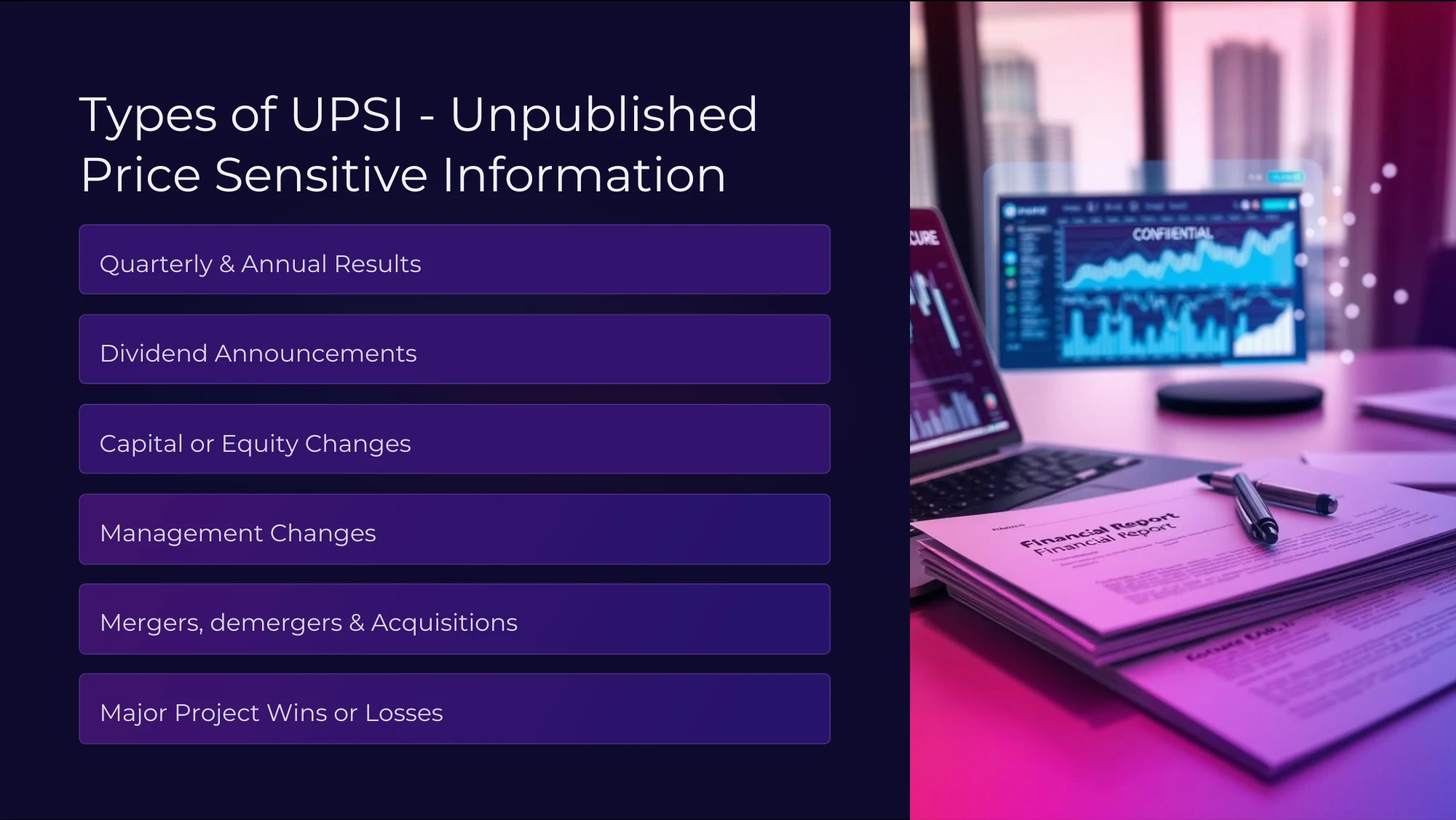
Who should use SDD Software / UPSI Management Tool?
Initially SDD Software (Structured Digital Database) was mandatory for only the listed entities or companies coming up with IPOs. But with SEBI’s new circular and guidelines related to PIT (Prohibition of Insider Trading) it is now mandatory for intermediaries and fiduciaries too.
SDD Law & PIT Regulations by SEBI
The SDD Law states that the company using Structured Digital Database (SDD Software) should have the complete internal access, should have an effective system and is required to keep the information for minimum 8 years for any inquiries or investigation.
The Director and/or designated persons will be counted non compliant if the above is not followed as per the guidelines.
SDD Software for Listed Companies, Intermediaries & Fiduciaries
An SDD Software (Structured Digital Database) / UPSI Management Tool helps any listed company, intermediary and fiduciary to manage and keep track of UPSI (Unpublished Price Sensitive Information).
As per SEBI’s recognized list, some of the Intermediaries & Fiduciaries include;
- Registered Alternative Investment Funds
- Registered Stock Brokers in Equity, Equity Derivative, Currency Derivative, Interest Derivative & Debt segment
- Bankers To An Issue
- Credit Rating Agencies – CRA
- Registered Custodians & Debenture Trustees
- Designated, Registered & Qualified Depositary Participants in CDSL & NSDL
- Registered Forien Venture Capital Investors, Inventment Advisors & Infrasturcture Inestment Trusts
- KYC Agencies Registered Under SEBI
- Merchant Bankers, Mutual Funds, Research Analysts & Portfolio Managers
- Registrar To An Issue & Transfer Agents
- Registered Venture Capitals, and more
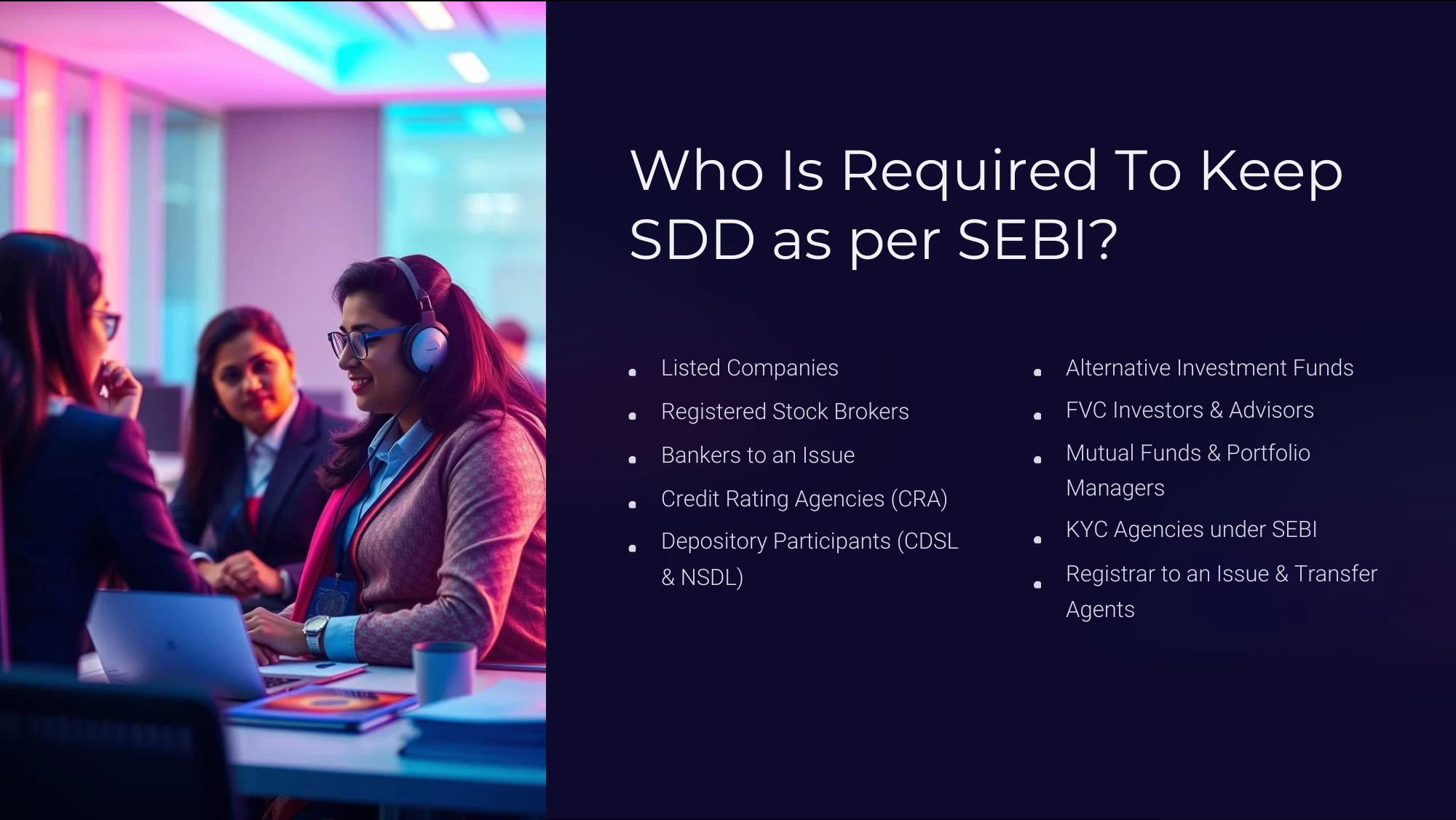
Users of SDD Software
In any SDD Software (Structured Digital Database) the main user to manage and keep track of UPSI is the compliance officer of that organization. Other than the compliance officer; Designated Persons (DPs), Connected Persons (CPs) and/or PCS (Practicing Company Secretary) / Auditor is included as users in an SDD Software to manage UPSI.
An SDD Software helps the compliance officer and organization to add all the relevant parties, also the SDD Software helps us to manage our trading window for all the relevant parties, it provides the facility for pre-clearence approval from the compliance officer as well as post trading updates, blacklisting/greylisting members, sending automation mails to relevant parties of different events/actions, managing disclosures, keeping up with SEBI ready reports to share with the authorities as and when required that includes Holding Statement, Designated Persons Report, Connnected Persons Report, UPSI Statement, Audit Logs, Mail Reports & pre-clearance reports.
Benefits of using SDD Software
- Track UPSI entries
- Manage trading window
- Pre-clearance approvals & post-trading updates
- Black/Greylist management
- Automated notifications
- Disclosure management
- SEBI-ready reporting
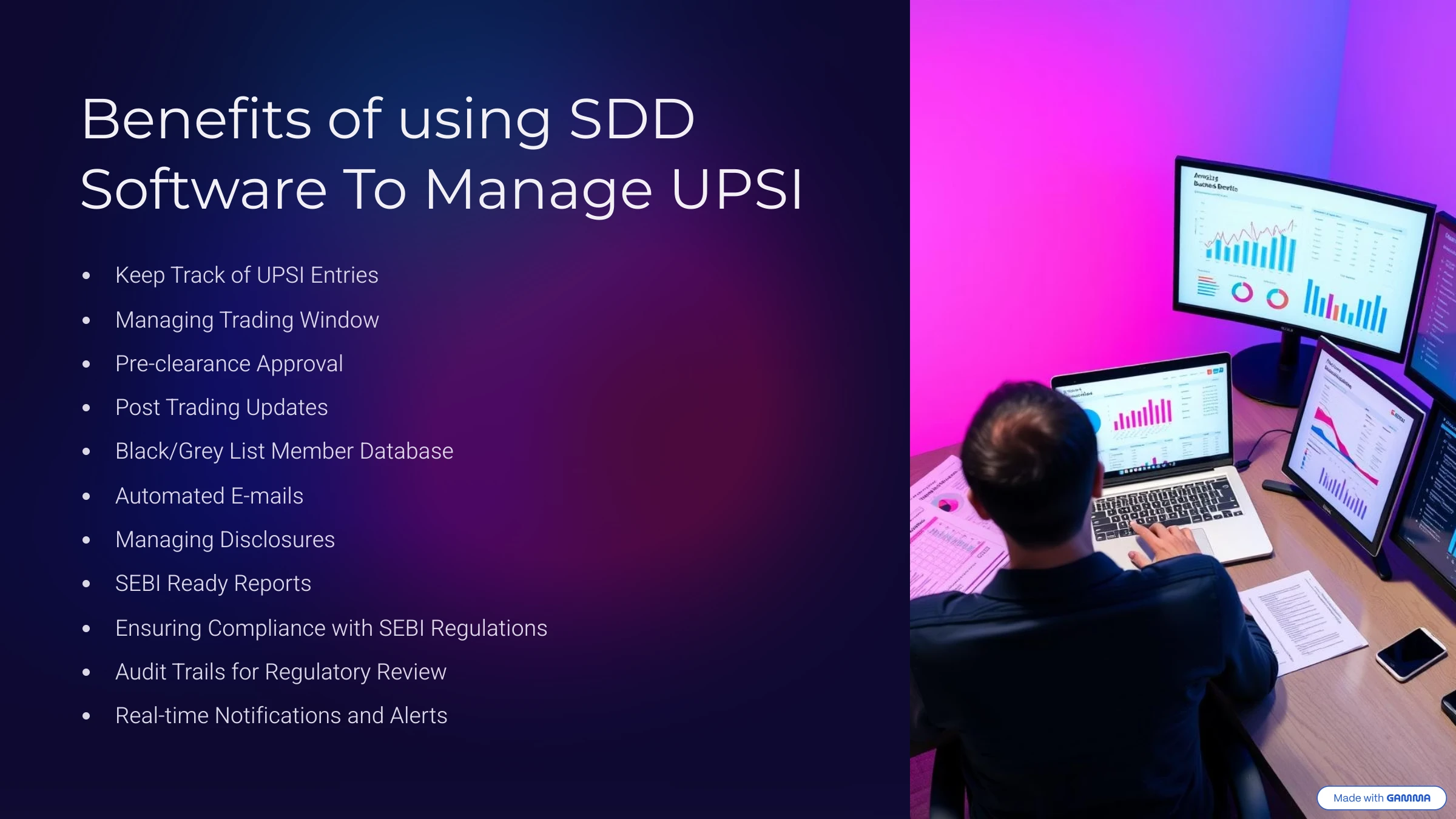
Guidelines of SEBI’s PIT Regulations 2015
As per SEBI Guidelines under PIT (Prohibition of Insider Trading), the listed entity is required to keep an SDD Tool To Manage UPSI. The organization should have the complete internal control over the SDD Tool, i.e. the control should not be with any third party. The UPSI data stored is to be kept minimum of 8 years for any investigations. The system should be effective on which the organization is keeping the UPSI Management Tool. It will be the CEO/Founder Team’s responsibility if the company fails to keep an SDD Software / UPSI Management Tool
SEBI has amended the Prohibition of Insider Trading (PIT) Regulations in 2024 and added Intermediaries & Fiduciaries to keep an SDD Tool For Managing UPSI for the associated and relevant entities to make sure there is a structured system. In the mew changes in 2024 SEBI has expanded the definition of Connected Persons and also a clarity was added for the term UPSI.
Penalties of not using SDD Software or UPSI Leak for a listed company
If the guidelines are not followed to keep an SDD Software / UPSI Management Tool and there is a individual or group of indivudals using UPSI for their gains, the penalties include;
- Fine up to ₹25 Crore or 3x of profit gains
- Imprisonment up to 10 years
- Disbarment/ban from the financial markets or directorship
Penalties for Non-Compliance Of PIT Guildelines by SEBI
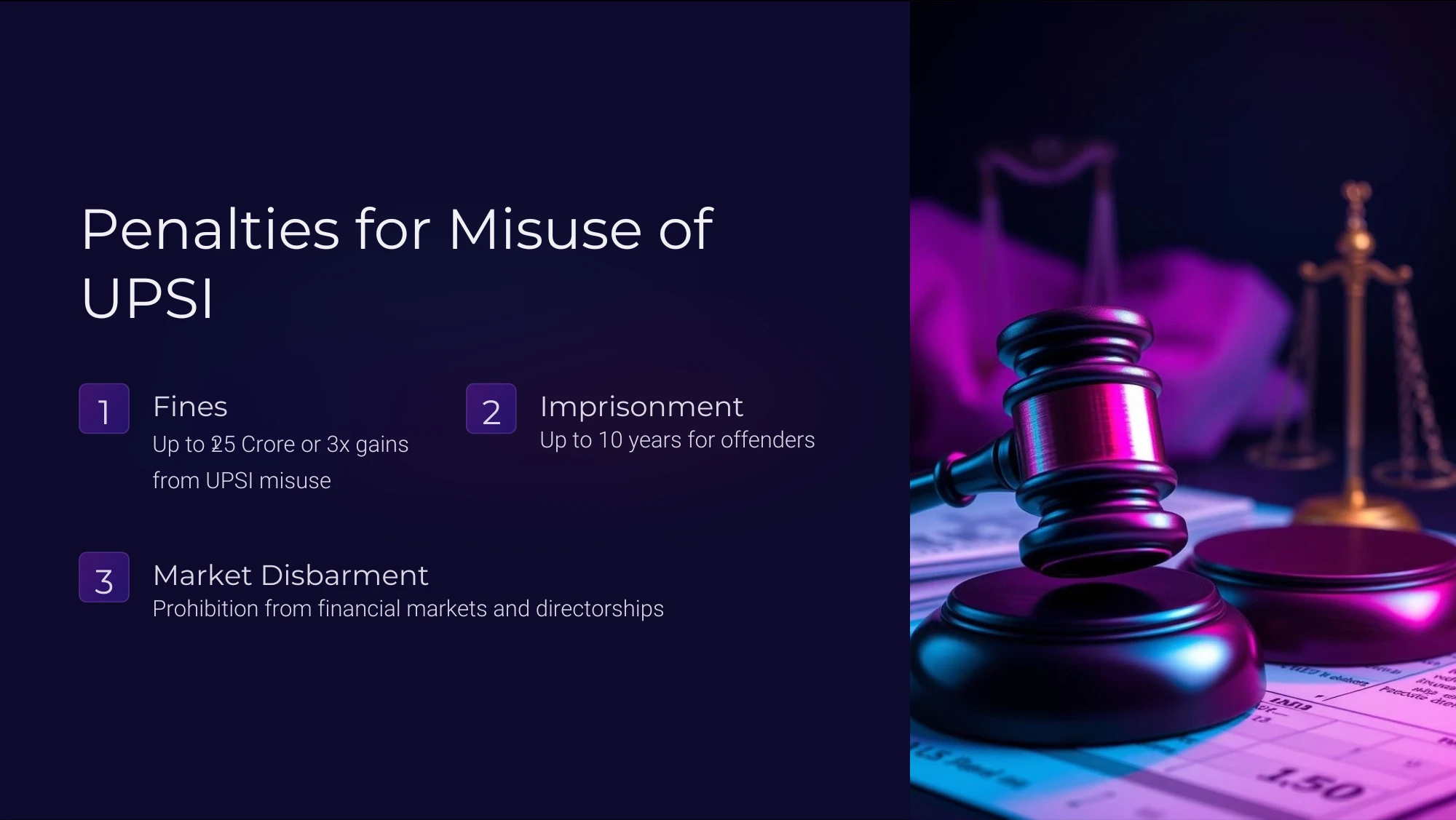
Price of SEBI SDD Software / UPSI Management Tool In India
The price of SDD Software varies in the range of INR 3000/- to 15000/- with the installation, and the same is charged as a license fee per annum.
Contact our team at Software Sahayak to find a compliant SEBI SDD Software / UPSI Management Tool at fair price from certified solution providers.
Conclusion
SEBI SDD Software or SDD System that is a Structured Digital Database becomes one of the most essential and required tools for any listed entity, company coming up with an IPO, intermediary or fiduciary to stay compliant with SEBI’s regulations and create a positive ecosystem that helps investors, organizations and overall economy with stabalized and genuine growth with real benefits. Software Sahayak can surely help your organization to find the SEBI SDD Software & UPSI Management Tool provider to find the best and user friendly SDD Software to manage UPSI and stay compliant
Note: This blog is for informational purposes. Please be aware of the guidelines and concept of the term SDD – Structured Digital Database To Manage UPSI. Kindly refer to SEBI’s official website to see the exact references and circulars for the complete information.
Your Needs, Our Responsibility
Submit Your Requirements
Our IT Services
End-to-end solutions tailored to your business needs
Web Development
Custom websites and web applications with modern frameworks like React, Angular, and Vue.js.
Learn more →App Development
Native and cross-platform mobile apps for iOS and Android, from concept to deployment.
Learn more →Software Development
Custom enterprise software and SaaS solutions tailored to your specific requirements.
Learn more →